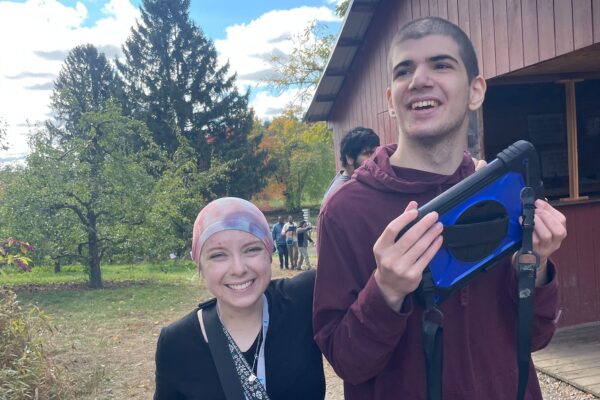October 17, 2024
NECC Celebrates AAC Awareness Month

This October, the New England Center for Children® (NECC®), a global leader in autism education and research, celebrated Augmentative and Alternative Communication (AAC) Awareness Month. The NECC community of speech-language pathologists (SLPs), families, and educators raised awareness about the pivotal role that AAC plays in empowering individuals to communicate and engage with their community.
AAC represents all the ways that people with difficulty speaking can communicate with assistive devices, ranging from writing to picture communication boards to sophisticated speech-generating devices (SGDs). Augmentative adds to speech, while alternative is used instead of speech.
Autism affects 1 in 36 children in the United States, according to the CDC, and while many individuals on the spectrum develop verbal communication skills, up to half of these students benefit from AAC strategies to express their needs, thoughts, and emotions. AAC tools are essential in providing NECC students with the ability to communicate effectively, fostering independence, self-advocacy, and social connections.
“NECC believes in the power of every voice, whether spoken or aided by AAC devices, to build a more inclusive future,” said Beth Bellone, director of speech and language services at NECC. “This month gives us an opportunity to share AAC triumphs and also to dispel myths about AAC, including the misconception that AAC hinders the development of verbal speech. AAC can support language development and reduce frustration for many of our students.”
AAC Awareness Month serves to not only inform the public but also to ensure that individuals with significant communication needs have access to personalized communication solutions. AAC is not a last resort; it’s a bridge to connection, learning, and social inclusion. With evidence-based strategies and person-centered approaches, AAC can open doors for many who have struggled with traditional communication methods.
Take for example Troy, who has profound autism and is nonverbal. Troy uses a high-tech speech generating device called the QuickTalker Freestyle from AbleNet. With his device, Troy can communicate and interact with others.
AAC Awareness Month also underscores the importance of interdisciplinary collaboration among speech-language pathologists, occupational therapists, special educators, behavior analysts, and families. Together, they play a crucial role in identifying the right AAC solutions for each individual, ensuring communication methods are tailored to their unique needs and strengths. This month is also an opportunity to celebrate the breakthroughs in technology and therapy that have made it possible for individuals on the autism spectrum to have their voices heard.